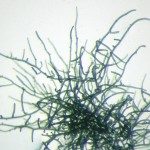Lien vers Pubmed [PMID] – 40901874
Lien DOI – 10.1073/pnas.2506928122
Proc Natl Acad Sci U S A 2025 Sep; 122(36): e2506928122
Circadian clocks allow organisms to anticipate daily fluctuations in light and temperature, but how this anticipatory role promotes adaptation to different environments remains poorly understood. Here, we subjected the cyanobacterium Synechococcus elongatus PCC 7942 to a long-term evolution experiment under high light, high temperature, and elevated CO2 levels. After 1,200 generations, we obtained a strain exhibiting a 600% increase in growth rate. Whole-genome sequencing revealed three mutations fixed in the evolved population, two of which were sufficient to recapitulate the fast-growing phenotype in the wild type. A mutation in the promoter of the shikimate kinase aroK led to its overexpression, while a mutation in the central circadian regulator sasA disrupted both the phase and amplitude of the circadian rhythm. Changes in circadian control led to widespread perturbations in the transcriptome and metabolome. These included major shifts in the Calvin-Benson-Bassham cycle and glycogen storage dynamics. While these changes increased fitness under the experimental conditions, they caused maladaptation when light or CO2 levels were altered, revealing a trade-off between fitness and environmental flexibility. Our results demonstrate that mutations in circadian control can drive fast adaptation by modulating central metabolism, underscoring the circadian cycle as a cornerstone of cellular plasticity. Thus, targeting the circadian cycle could be key to engineering cyanobacterial strains optimized for carbon fixation and biomass production.

